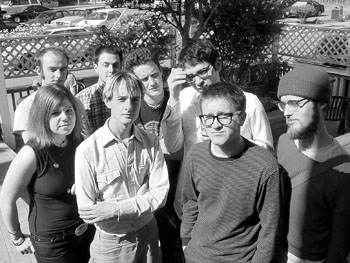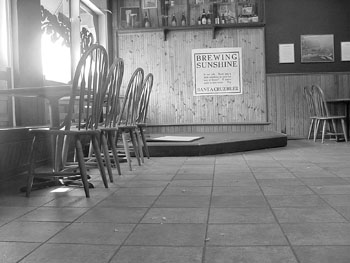![[Metroactive Music]](/music/gifs/music468.gif)
[ Music Index | Santa Cruz Week | SantaCruz Home | Archives ]
The Way the Music Died
Why cutting the red tape didn't end the crackdown on live venues
By Hiya Swanhuyser
ONCE UPON A TIME three years ago, Santa Cruz was having itself quite a culture clash. Music, it seemed, was under attack. Uniformed officers of the law canceled concerts. Small venues stopped having music. According to police, any place with amplified music was a "nightclub," and was responsible for a $732 permit at least. Things looked bleak for local and independent performers.
A few brave voices, including that of ukulele player Oliver Brown, spoke up, demanding justice. And after reviewing the facts, people seemed to agree that smaller places, especially if they didn't charge admission, shouldn't be faced with the same permits as larger venues.
Eventually, someone pointed out that section 5.44 of the Municipal Code, a.k.a. "the ordinance" or The Law, was 37 years old. Perhaps a bit of an update was in order. So a coalition of do-gooders drafted some new language for the ordinance, taking small venues into account. City Council seemed to like it. Change seemed imminent, reflecting the art-friendly concerns of the community in general. Things were looking up.
No Change: The music permit issue, then and now.
Silent Nights: Musician Oliver Brown offers a list of places that no longer host live music events.
Sound and Fury
Fast-forward three years to Feb. 22, a Saturday night. The Pisces Moon Theater Company was well on its way to selling out all performances of The Laramie Project, a nationally acclaimed play about the tragic death of Matthew Shepard.
"It was during the first intermission," says Susan Myer, the show's director, of the now-infamous incident at the Art League. "Lieutenant Tom Vlassis came, and I was in the back room with the actors."
Myer says she isn't sure exactly what happened next but that Vlassis "said enough things to get the stage manager riled up, and she's a very serene person ... I found out later they said they were going to haul [the stage manager] off to jail."
Myer spoke with Vlassis, but it didn't go well. "He said we were noncompliant, and it had been his job since November to make sure that places were in compliance. He was telling me in this threatening way, 'I can close you down,'" she says.
Myer says Vlassis eventually backed off and admitted that "it would be a shame to shut this show down--there seems like a lot of nice people here."
At a City Planning Commission hearing on April 4, Linda Kimball, owner of the Cayuga Vault, stood before the commissioners politely describing how Vlassis came to her place of business and threatened to "shut down" the Vault if she didn't stop all music immediately and get a new permit. When she applied for the expensive permit, she found that her all-ages, alcohol-free venue was classified as a nightclub.
"We're really not a nightclub," she told the commission.
Around here, the issue of live music vs. law enforcement is an old, old story. You can tell just how long Brown--a longtime champion of the struggle to safeguard performance spaces--has been dealing with it as he rattles off a list of bars, cafes, dance galleries and other spaces once graced with his popular ukulele tunes that have since fallen silent.
"So the question is," he says, "where am I supposed to play?"
Brown also believes supporters of the arts are treated harshly around these parts. "[Some places don't] have music because they were threatened," he says. "They got scared, because a policeman came in and said, 'We can shut you down.' They never said, 'It's this ordinance number or that ordinance number.'"
Vlassis sees it differently. "Our task is to enforce the laws. We enforce all laws," he says. "Our primary endeavor is to get voluntary compliance. A violation is a violation. Is there a God-given right to a warning? No."
Nor does he agree that the police have enforced local live music laws inappropriately.
"When we are made aware of a possible violation, we go out and investigate," he says. "If we find a violation occurring, we inform the people of what their legal obligations are. If someone comes to you and says, 'I'm sorry, you have to have X before you do Y,' that's a warning. I'm not sure what people are telling you, but I would challenge you that we haven't gone and popped anyone for a first-time violation."
But have officers been too harsh or heavy-handed in the service of silence?
"Well," says Vlassis, "we also hear that when we stop people for traffic violations. I think some people might feel that getting a warning is overly harsh."
It's a Good Law, If You Can Find It
Enforcement issues aside, isn't this the same section 5.44 that was deemed out-of-date three years ago? How long does it take to change a bad law around here, anyway?
Well, it turns out the revamped ordinance never quite became part of the Municipal Code, but was adopted by the City Council as a resolution, on a legal par with Nuclear Free Zoning--not noted in the same place as other laws, but law all the same.
The resolution states clearly, in Vlassis' words, "If your occupancy is under one hundred and you don't collect a fee, then you still have to have a permit, but you don't have to pay the fees."
Great, right? The permit process can be a paperwork pain in the rear, sure, but at least it's free. But how does someone find this information? Vlassis readily admits that while ignorance of the law may be no excuse, it is quite common.
"Most people are saying, 'I didn't know, I didn't know what to do.' Honest mistakes," he says. "We have a pamphlet at the PD, explaining everything. It's on my desk. We're going to make darn sure people know what to do before we put on the enforcement hat."
But again, where is this information made available? Supposing not everyone wants to go to the Desk of Vlassis, where else can they find that pamphlet?
"I don't know," Vlassis admits.
At the city clerk's office, Connie Ricker answers the phone sounding perky.
Hi, Connie! Where's the code that says people might not have to pay a $732 fee?
"Do you have a computer?" she asks. It's a good question, one that suggests any idiot might think to start searching for the code by looking at the Municipal Code database on the City of Santa Cruz's excellent website.
However, a daylong search of the ordinance produces no information on free permits. Ricker spends a long time using a search engine that isn't available to the public, and finally finds that the law is in the form of a resolution, buried in the archives of City Council meeting minutes--not really accessible to the public.
"I haven't seen the application," Ricker admits, "but I think the information is there. We're not keeping any secrets."
But how can citizens find this information on their own? Ricker seems to be getting a little annoyed. "By asking questions, like you would with any resolution," she says. "From my point of view it's very easy, but that's my job. I guess I can't speak for the public."
The More Things Change ...
It appears that little has changed in three years: police make unwelcome visits to venues who want to host small events, performers feel the law is there to stop them and many businesses have stopped hosting entertainment. There is still almost nowhere for local, independent performers to do their thing.
And yet, everyone seems to want to encourage the arts. Everyone interviewed for this story provided pithy sound bites to that effect, from politicians to police to performers. So what gives?
In what looks like a giant game of hot potato, no one seems to know why so little has changed. Veterans of the arts community say the police are overzealous and selective in their enforcement, which cops deny. Some people say the city's trying to raise money any way it can, but that doesn't match up with the number of small venues who wouldn't pay anyhow. Conspiracy theorists suggest that police and some city officials harbor personal vendettas against nightlife of all kinds, having been nerds in high school. Cops say venue owners are either trying to get something for nothing, or aren't taking the time to learn about the basic procedures. Young performers don't know what's wrong, only that they're out of luck.
For those looking to change the local live-music laws, one of the anonymous sources for this story sees a few ways to force the issue: "One, go through the council, get four votes. But that's always going to be a compromise, because the police will act as legislators, taking the teeth out of any ordinance. Two, someone could sue the city, to challenge the ordinance in a court of law. But that's really expensive. Three, someone could get arrested for having performances without a permit. And the fourth way is that a venue owner could get a permit and then appeal part of it, again to get it into court, where it has a better chance of fair treatment."
As it is, it looks like there needs to be a serious heads-up about the existing ordinance all around. Venues need better access to clear instructions on how to get and keep the right kind of permit, police need to consider that harsh warnings are often de facto permit revocations, performers need to know that they too are responsible, and the public, which is always hungering for more live music in this town, needs to know when the next generation of shows is going to start.
Copyright © Metro Publishing Inc. Maintained by Boulevards New Media.
![]()

Trying to Get Some Play: Local musicians are plenty pissed over the lack of venues.
![[line]](/gifs/line.gif)
![[line]](/gifs/line.gif)

All Quiet at the Front: Front St. Pub is just one stage that's gone empty.
From the May 23-29, 2002 issue of Metro Santa Cruz.